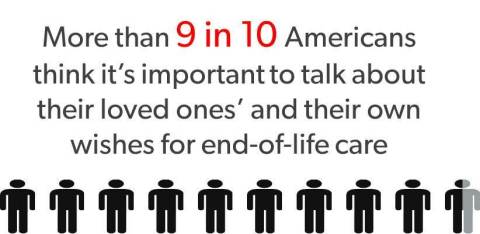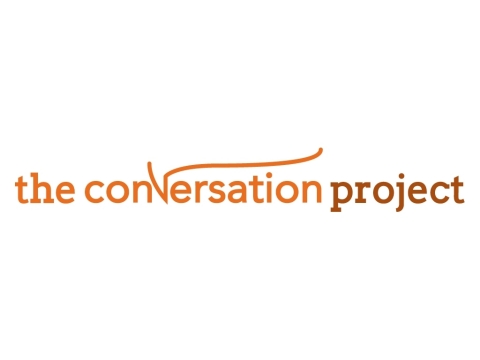CAMBRIDGE, Mass.--(BUSINESS WIRE)--There’s a big gap between what people say they should discuss and what actually happens when it comes to one’s wishes about care at the end of life. A new national survey released today by The Conversation Project reveals that while more than 9 in 10 Americans think it’s important to talk about their own and their loved ones’ wishes for end-of-life care, less than 3 in 10 have actually held these sorts of discussions.
“We have arrived at something of a sea change. Americans now overwhelmingly agree that it's important to talk with our loved ones about how we want to live at the end of our days. Yet, we still find it hard to begin those conversations,” stated Ellen Goodman, Founder of The Conversation Project. “We need to close the gap so that people will die in the way they would choose.”
The Conversation Project was launched one year ago in collaboration with the Institute for Healthcare Improvement (IHI) to enable more people to sit down at the kitchen table with family members and friends, and talk about what will matter most at the end of their lives. Through a public engagement campaign, a web site, story sharing and other tools, the project encourages people to have these discussions long before there’s serious illness or a health crisis.
Many have taken its message to heart, with more than 62,000 downloads of The Conversation Project’s Starter Kit to date. The new survey shows there are still plenty of barriers.
It’s always too early, until it’s too late.
- There are a host of reasons why Americans haven’t discussed their own wishes. Top reasons from the survey include: It’s not something they need to worry about at this point in life (29%), they aren’t sick yet (23%), the subject makes them feel uncomfortable (21%), or they don’t want to upset their loved ones (19%).
- Similarly, among those who haven’t talked about their loved ones’ desires for their final days, top reasons for avoiding the conversation are “it never seems like the right time to discuss it” (25%) and “it isn’t something they need to worry about at this stage in their life” (21%).
Everybody is waiting for someone else to start.
- One-fifth of Americans who haven’t broached the subject are waiting for their loved ones to bring the topic up first.
- Yet anxiety over initiating the conversation is unnecessary, as nearly half (48%) of Americans say that if a loved one asked them about their wishes for end-of-life care, they’d welcome it and be relieved to discuss it. Another 41% admit that while it would be a difficult discussion to have, they’d be willing to do it.
When we do talk, the experience is improved.
- More than half of those who have lost someone without ever discussing end-of-life wishes admit that some aspect of the experience could have been improved if they’d had a conversation.
- Those who did have such a conversation had what could be considered a more positive experience in their loved ones’ final days – 63% say they felt better knowing they were honoring the wishes of their loved ones, while 39% know their loved one was able to die just the way they wanted.
IHI’s President and CEO, Maureen Bisognano, welcomed the survey findings. “The Conversation Project is one of the most visible efforts out there encouraging all of us to discuss our deeply held values about end-of-life care. Everyone, including health care providers, has a role to play to close the current gap.”
Goodman added, “This is no longer a taboo subject. The Conversation Project wants to help make it easier for all those people who are ready but reluctant to start expressing their wishes. We know that this is right moment.”
About the Survey
The Conversation Project survey was conducted by Kelton in two separate waves, between July 24 and July 31, 2013, among 1,067 nationally representative Americans ages 18+, and between August 30 and September 5, 2013, among 1,006 nationally representative Americans ages 18+, using an email invitation and online survey. Quotas were set to ensure reliable and accurate representation of the entire U.S. population ages 18 and over. Margin of error = +/- 3 percent.
About The Conversation Project
The Conversation Project, co-founded by Pulitzer Prize-winner Ellen Goodman and launched in collaboration with the Institute for Healthcare Improvement (IHI), is a public engagement campaign with a goal that is both simple and transformative: to have every person’s wishes for end-of-life care expressed and respected. Too many people die in a manner they would not choose, so The Conversation Project offers people the tools, guidance, and resources they need to begin talking with their loved ones, around the kitchen table, about their wishes and preferences. Have you had the conversation? Learn more at www.theconversationproject.org.




